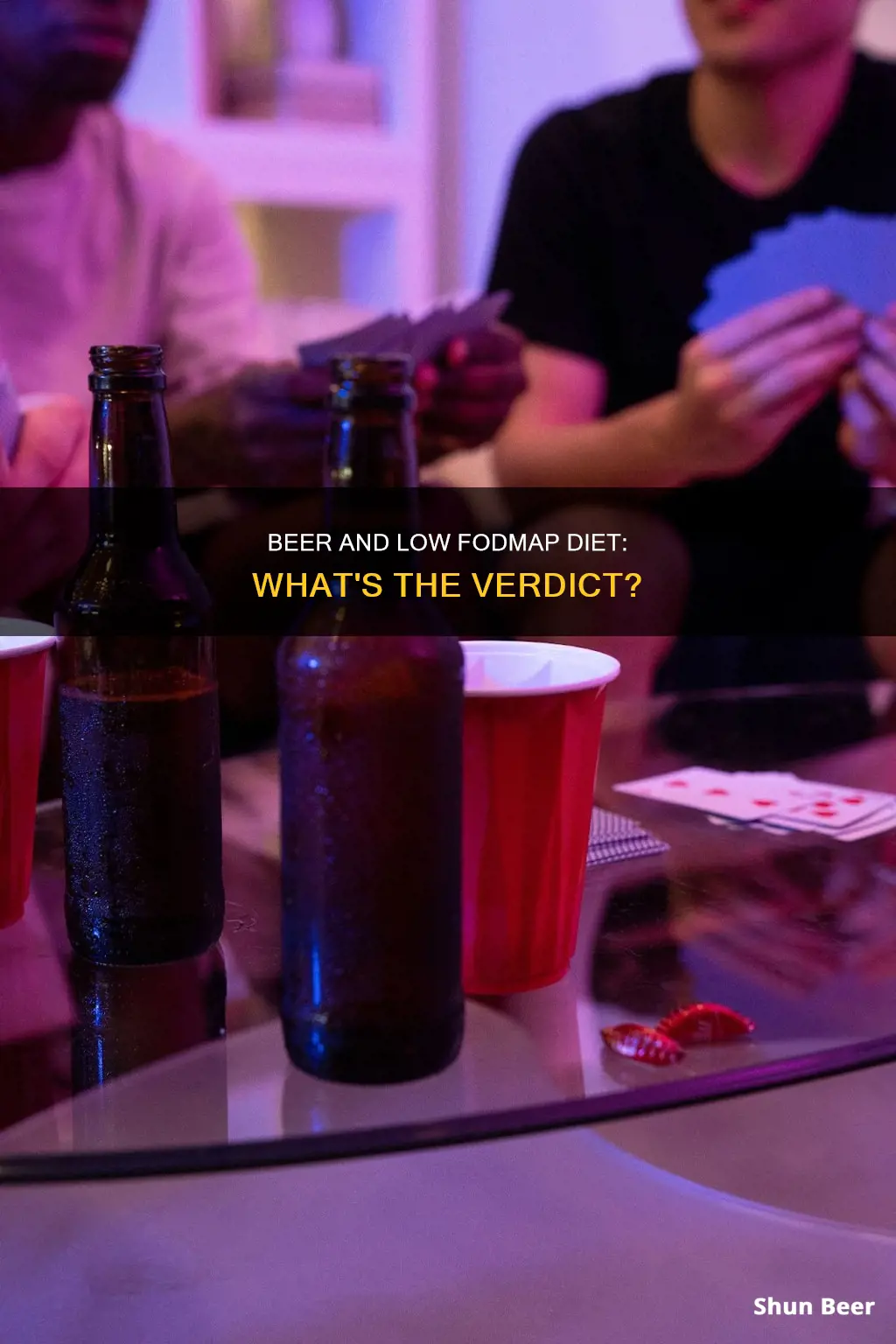
If you're on a low-FODMAP diet, you may be wondering if you can still enjoy a beer. The good news is that you can! Beer is made from ingredients that contain FODMAPs, but the beer-making process breaks down the fructans, leaving a low-FODMAP alcoholic drink. However, if you have celiac disease or gluten sensitivity, you'll need to stick to gluten-free beers as fermentation does not impact the protein gluten.
While beer is generally considered low-FODMAP, some people may still experience digestive issues due to the carbonation in beer. If you find that carbonated drinks affect you, it's best to avoid beer and opt for other low-FODMAP alcoholic drinks.
| Characteristics | Values |
|---|---|
| Beer low in FODMAPs | Yes |
| Beer gluten-free | No |
| Beer safe amount | 12 oz. of 5% alcohol beer |
| Beer carbonation | Could be an issue for some |
What You'll Learn
- Beer is low FODMAP, but not for those with celiac disease or gluten sensitivity
- Beer is made from high-FODMAP ingredients, but the yeast breaks down the fructans during fermentation
- Beer may cause bloating and gas due to carbonation
- Beer is best enjoyed in moderation, paired with food, and alternated with water
- Red, white, and sparkling wines are low FODMAP, but avoid dessert wines

Beer is low FODMAP, but not for those with celiac disease or gluten sensitivity
Beer is low in FODMAPs, but it is not suitable for those with celiac disease or gluten sensitivity. While beer is made from barley, wheat and rye, which are high in fructans, the yeast breaks down these fructans during the fermentation process, converting them into alcohol. This means that beer is low FODMAP. However, the fermentation process does not break down gluten, so those with celiac disease or gluten sensitivity must choose a gluten-free beer instead.
Beer is not the only low-FODMAP alcoholic option. Monash University has determined that red, white and sparkling wines are all low FODMAP in servings of one 150ml glass. Gin, vodka, whisky, tequila and brandy are also low FODMAP in servings of one 30ml shot.
It is important to note that alcohol is a gut irritant, so even low-FODMAP drinks could trigger IBS. It is recommended that those with gastrointestinal issues follow the advice of the National Health Service (NHS) in the UK and limit their drinking to two standard drinks at a time. It is also a good idea to drink in moderation, drink water in between alcoholic beverages, avoid drinking on an empty stomach and choose your alcohol and mixers carefully.
Beer Left Out: Is It Still Safe to Drink?
You may want to see also

Beer is made from high-FODMAP ingredients, but the yeast breaks down the fructans during fermentation
Beer is made from grains such as barley, wheat, and rye, which are high in fructans (a FODMAP). However, during the beer-making process, the yeast breaks down these fructans through fermentation, leaving a low-FODMAP beverage. This means that beer is generally safe for those following a low-FODMAP diet, but there are a few important considerations to keep in mind.
First, while beer is low-FODMAP, it does contain gluten. Therefore, it is not suitable for individuals with celiac disease or gluten sensitivity unless specifically labelled as gluten-free. Additionally, some people may find that they are sensitive to the carbonation in beer, which can cause bloating and gas. If you find that carbonation affects your symptoms, it may be better to opt for non-carbonated low-FODMAP drinks such as wine or spirits.
It is also important to note that while beer is low-FODMAP, alcohol itself can be a gut irritant and may trigger IBS symptoms even when consumed in moderation. Therefore, it is recommended to drink in moderation, pair your drink with food, and alternate alcoholic beverages with water to stay hydrated.
When it comes to alcohol and the low-FODMAP diet, it is always a good idea to listen to your body and pay attention to your own tolerance levels. What works for one person may not work for another, so it is important to be mindful of your own triggers and adjust your choices accordingly.
Beer at Work: Is It Legal?
You may want to see also

Beer may cause bloating and gas due to carbonation
Beer is low FODMAP, but carbonation and gluten may be an issue for some people. Beer is made from high-FODMAP ingredients like barley and wheat, but the yeast breaks down the fructans in the grains during the fermentation process. By the time the grains have turned into beer, they are low FODMAP. However, fermentation does not impact the protein gluten, so if you have coeliac disease, you will need to choose a gluten-free beer.
Carbonation in soft drinks can be a gut irritant. Some people react to the carbonation in sparkling drinks, so make sure you test them out at home first. Carbonation can cause bloating and gas, which are common symptoms of IBS.
If you are drinking beer, it is recommended to consume it in small portions over a long period of time. This will allow the alcohol to travel through your gut in small batches so your body can cope with it more easily. Always pair your beer with a small meal or substantial snack, and never drink on an empty stomach.
Beer and Muscle Gain: Is It Possible?
You may want to see also

Beer is best enjoyed in moderation, paired with food, and alternated with water
Beer is a low-FODMAP drink, but it's important to remember that it's still a gut irritant and can trigger IBS symptoms. So, it's best to enjoy beer in moderation, especially if you have IBS or other gastrointestinal issues. Here are some tips to help you include beer in your low-FODMAP diet:
Enjoy Beer in Moderation
Moderation is key when it comes to drinking beer, especially if you're following a low-FODMAP diet. According to the National Health Service (NHS) in the UK, it is recommended to limit your drinking to two standard drinks at a time. For beer, this translates to one 12 oz. drink that contains 5% alcohol. It's important to stick to these guidelines to avoid potential gastrointestinal issues and IBS triggers.
Pair Beer with Food
It's important to never drink beer on an empty stomach. Always pair your beer with a small meal or substantial snack. Having food in your stomach can help protect it from irritation and reduce the impact of alcohol on your digestive system. Choose your food wisely and avoid foods that trigger your IBS symptoms.
Alternate Beer with Water
Drinking water between your beers is crucial. It helps you reduce your overall alcohol consumption and keeps you hydrated. Drinking water may also help dilute the alcohol, making it less irritating to your stomach and gut. You can try drinking chilled water from a wine glass to make it feel more like a treat.
Choose Gluten-Free Beer if Needed
While beer is low-FODMAP, it does contain gluten. If you have celiac disease or gluten sensitivity, opt for gluten-free beers. Fermentation does not break down gluten proteins, so it's important to choose certified gluten-free options to avoid adverse reactions.
By following these guidelines, you can safely include beer in your low-FODMAP diet and still enjoy your favourite beverage. Remember to always listen to your body and adjust your consumption accordingly.
Drinking Beer in the Back Seat: What's the Law?
You may want to see also

Red, white, and sparkling wines are low FODMAP, but avoid dessert wines
While on a low-FODMAP diet, it is important to understand that alcohol is a gut irritant, which means even if you choose a low-FODMAP drink, it could be an IBS trigger. Alcohol can cause your stomach to produce more acid than usual, which can cause gastritis, stomach pain, vomiting, and diarrhoea. Therefore, it is recommended to drink in moderation and pay attention to your consumption to determine whether the type and amount of alcohol affect your IBS.
Red wine is low FODMAP at a 150ml (1 glass) serve. This means you can enjoy your glass of pinot noir, cabernet, shiraz, or zinfandel. Just make sure you limit your serving size to 1 glass as according to the Monash University Low FODMAP App, larger servings can contain excess fructose.
White wines are also low FODMAP and safe to drink in 150ml (1 glass) servings. According to Monash University, white wines are safe to drink in moderation. Dry white wines have less residual sugar than standard white wine, so they are considered the safest if you malabsorb fructose.
Sparkling wine is usually a white wine or rosé that contains carbon dioxide to make it fizzy. Champagne is a classic example of a sparkling wine and it is low FODMAP at a 1 glass serve. While the majority of sparkling wines are white or rosé, there are examples of red sparkling wines such as Italian Brachetto, Bonarda, and Lambrusco, and Australian sparkling Shiraz.
However, it is important to avoid dessert wines such as fortified wines or sweet dessert wines like sherry, port, and ice wine. These wines contain excess fructose, which would make them high FODMAP.
Drinking Beer in Munich: What's Allowed in Public?
You may want to see also
Frequently asked questions
Yes, beer is low FODMAP. However, it's important to note that beer contains gluten, so it's not suitable for people with celiac disease or gluten sensitivity unless it's specifically labelled as gluten-free.
According to Monash University, one can of beer (375ml or 12 ounces) is considered a low FODMAP serving.
Yes, there are several other options for low FODMAP alcoholic drinks, including red, white, and sparkling wines, as well as spirits like gin, vodka, whiskey, and tequila. However, it's important to watch out for mixers and choose low FODMAP options like club soda or fresh lime juice.
Here are a few tips to help reduce alcohol-induced IBS symptoms:
- Drink in moderation and try to stick to one or two drinks.
- Don't drink on an empty stomach. Have a decent meal before you drink.
- Alternate your alcoholic drinks with water to stay hydrated.
- Choose gluten-free or low-FODMAP mixers like cranberry juice or club soda.







